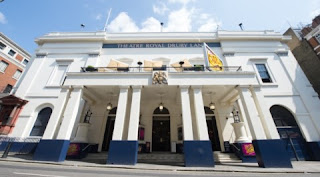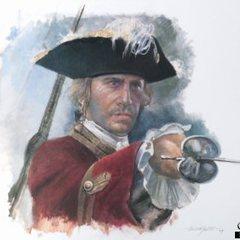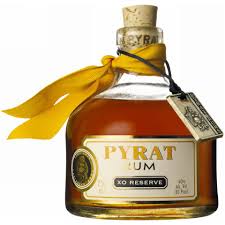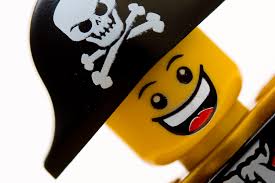The Successful Pyrate is a play by Charles Johnson. It was
first performed 1712 and published 1713, and dealt with the life of the pirate
Henry Avery (Every).
Charles Johnson (1679 – 11 March 1748) was an English
playwright and a tavern keeper. He claimed that he had been trained in law, but
there is no evidence of this. At the same time, it is possible that he actually
was a lawyer, as his first two published works, (Marlborough; on the Late
Glorious Victory Near Hochstet in Germany and The Queen; a Pindaric Ode)
list him as living in Gray's Inn. This was one of the four “Inns of Court” and
in order to practice law in England or Wales a person must belong to one of
these inns. He married a Mary Bradbury in Gray's Inn
chapel in 1709, the year of his first play, Love and Liberty.
 |
| Drury Lane Theater, still in use today |
Around the year 1710, Johnson became friends with Robert
Wilks, the actor-manager of Drury Lane Theatre. Wilks was able to see that Johnson's
plays received consideration. In 1711, The Wife's Relief, or, The
Husband's Cure was a great success.
In 1712, The Successful Pyrate was produced, and complaints
were made to Charles Killigrew, Master of the Revels that the play glamorized
the pirate Henry Every. However, the play's controversy helped its profitability,
and it was a theatrical success.
 |
| Artist's conception of Henry Avery |
The Successful Pyrate is a glamorized adaptation of two
episodes contained in a pamphlet about the career of pirate Henry Avery: his
capture of the Mogul ship Gang-i-sawai,
allegedly carrying the Mogul's granddaughter, and a plot against Avery by his
lieutenant De Sale and other pirates.
In the play, Avery goes under the name Arviragus, and has
made himself a King in Madagascar, the legendary east-African pirate island. He
captures the Indian princess Zaida and tries to force her to marry him, but she
is in love with a young man named Aranes. The two have an offstage fight and
Aranes is reportedly killed; meanwhile, De Sale, who has confided to the
audience that he is plotting to overthrow Arviragus and become King,
ingratiates himself with Zaida.
De Sale's fellow plotters are blundering fools and their
plans are easily thwarted. A comic trial scene follows. Then it is revealed
that Aranes is Arviragus' long lost son, and that he is still alive, his friend
Alvarez having died in his place. The plotters are executed and Aranes and
Zaida marry.
 |
| Artist's conception of Avery meeting the Mogul's granddaughter |
The play is reportedly more comedy than anything else. The
pirates are mostly fools, especially Sir Gaudy Tulip, an aged and cowardly
London beau. The Gang-i-sawai is, for
comic effect, carrying two European ladies, Tulip's ex-mistress and another
pirate's ex-wife, who exchange comedic comments with the men. The drunken
conspirators and outrageously partial court are played entirely for laughs.
Charles Johnson’s name may very well have inspired the pseudonym
of another great pirate author. A General History of the Robberies and Murders
of the Most Notorious Pyrates was written, supposedly by Captain Charles Johnson.
 |
| The General Histotry |
Who was this person? Arne Bialuschewski of the University of
Kiel in Germany has recently suggested Nathaniel Mist, a former sailor,
journalist, and publisher of the Weekly Journal, as a more likely candidate.
Charles Rivington (publisher of the History), had printed books for Mist, who
lived near his office. The General History was registered at Her Majesty's
Stationery Office in Mist's name. As a former seaman who had sailed the West
Indies, Mist, of all London's writer-publishers, was uniquely qualified to have
penned the History.
So why use Johnson’s name? Some scholars think that, to someone
who knew pirates and respected them, Mist was affronted by Johnson’s treatment of
the much-respected Avery. Is this true?
We may never know, but it seems plausible.






